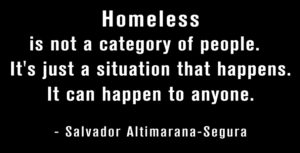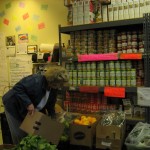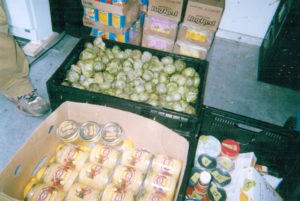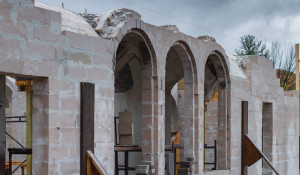Paul, Duct Tape, and Homelessness


Paul has been on my mind all week.
One of my oldest friends, I knew him and worked with him when I worked and lived in Virginia – just outside Washington D.C.
Back then, we had Kelly Girls. Paul was my very best Kelly Girl. I could send him anywhere – well, not to the male chauvinist lawyer who would only pay for a cute legal secretary. But all the others loved his work.
He showed up on time for his assignments and he turned out a perfect work product. He was a bargain. Whatever he did, he made the client feel that Paul gave more than the money’s worth for every job done.
Everyone knew Paul was homeless. Nobody cared. He was the best typist out there. (This was before computers, you understand.) A quality work product counts for a lot when it comes time to pay the bill, after all.
So why have I been thinking about Paul all week? It was the Duct Tape that did it. My watch band broke and I need the watch. I drove over to Genter’s Jewelry Store in Saugerties and discovered a “for rent” sign where the “open” sign used to be. Mr. Genter always fixed everything . He didn’t care whether it was a watch band, a clock, a necklace.
He also sold silver and gold chains at bargain prices. And, he custom designed a coin for me. His work was exacting. Genter’s was my go-to destination for all things jewelry.
Genter’s is a statistic of the Coronavirus. With Mr. Genter gone, what was I going to do? I physically grieved when I saw the sign in the window.
I went straight for the Duct Tape. I now wear a watch held together with Duct Tape. I’m getting used to it, actually. My sense of urgency diminishes a little more each day.
I’m sure I’ll get along just fine with the Duct Tape. Paul Did.
Duct Tape adorned most of Paul’s clothes and anything else he used. Duct Tape held Paul’s shoes together. Duct Tape held the watch on Paul’s arm. Duct tape even kept Paul’s eyeglasses going. Finally, Duct Tape held Paul’s winter coat together.
So, following in Paul’s example, Duct Tape will keep my fitness watch going.
I rather like my new Duct Tape look. And, I like remembering Paul. He always made me smile. And, smiles these days are hard to come by.
Thanks Paul! You set a good example. This Duct Tape will work until I can find Mr. Genter, just as Duct Tape held your shoes together until you could find a newer used pair of shoes.
And, thank you for reading this article. Please forward it to your preferred social media network.
Thurman Greco
Woodstock, New York
PS: You can order one or more of the fancy T-shirts pictured in this post today at :
www.thurmangreco.com.

I also wrote about Paul in “No Fixed Address.”

I Need a Gun – “Ketchup Sandwich Chronicles” – Hunger is not a Disease

“How much is an application for a gun permit?” I was the only cotton topped little old lady in the line at the Golden Hill government office in Kingston.
The counter person, an overweight man in his fifties, could hardly contain his laughter as he handed me the gun permit application. “That’ll be $5.00 please, miss.”
After handing him the money, I started to walk away. Then, turning back to him, I said pleasantly, “Will you sell me three more applications, please? A couple of the girls in my senior yoga class asked me to get applications for them, too.”
Pulling out $15.00 more, I put the money on the counter. The man gave me three more gun applications and I walked away. I had no idea who was going to receive them and I didn’t attend any senior yoga class but I remembered the old “Alice’s Restaurant” song about three people doing something and being part of a movement.
Things in the pantry were negative and confrontational since the first day I drove up with fresh produce for the hungry people shopping in the pantry. In the beginning, I tried to hide things and overlook the situation. Frankly, I hoped the negativity would just go away. And, of course, I was mistaken. Situations like that don’t just evaporate. People don’t just change. And now, I was beginning to tire of the whole situation. I’d been living with fear for years and was feeling like it was time to try to fix things.
Maybe a gun will help, I thought.
When I got home, Barry was sitting on the sofa, surrounded by his cats, Fizzle and Carrots, as he read his latest thriller.
“Hi, honey. How’s your day going?” Without looking up, he took a few grapes from a large fruit filled bowl on a table by the sofa.
“Here’s the application for the gun permit I just got. I want you to teach me to shoot a gun.”
“What!?”
“You can do it. You didn’t spend all those years sneaking off to the CIA without knowing how to use a gun. They even gave you a medal or something. For all I know, you’re a damn bazooka expert. Maybe I want to learn that, too!”
“You can’t do that! You might shoot one of the Chihuahuas.”
“Well, I’m tired of asking pantry volunteers to be bodyguards. It’s not safe when I’m working after hours at the pantry. And, I’m not one bit afraid of the shoppers.”
“Listen, I know your job is difficult. Not even a Marine drill sergeant would do what you’re doing. But, I don’t know about a gun.”
“That Mag-Lite I bought a while back just isn’t what I need. A gun is more powerful and I’ve lived with them my whole life. My grandmother kept a rifle in her bathroom.”
“T.G. you’re just not the gun type. I’ll teach you to use a knife. A good knife won’t cost as much as a gun and you won’t need a permit. You won’t need to buy bullets. There’s nothing to clean unless you stab someone. It’ll be easier to use and carry. I’ll give you some lessons. Nobody will ever know. It’ll be our secret. Leash up the Chihuahuas. We’re going to Warren Cutlery in Rhineback.”
And so he did. He took me to Warren Cutlery where there was a generous selection of knives. We went into the knife room which included stock for kitchens as well as other knives not designed to slice and chop onions. I stood in front of the case. “Which knife are you interested in?” The clerk spoke to me as though showing weapons to a cotton topped old lady was the most boring thing he did all day. And, maybe it was.
“I’d like to see the one over there with the four-inch blade, please.” I held it in my hand and then asked to see several more on display in the case. Barry walked over to the case, stood beside me, and saw the knife I held in my hand.
“That knife is too big and too heavy.” he said, pointing to a smaller model. “You need something you can carry in your purse and you need something you can open rapidly. If you’re too slow, your attacker will have you down before you get it open.”
So, I chose a smaller, lighter model that happened to be on sale.
Barry paid the bill, and off we went.
He did just what he said he would. He taught me how to open a knife quickly but never bothered teaching me to close it.
And, he was correct. A knife is quiet. It weighs less than a gun. There’s no need for a permit. The Chihuahuas won’t get shot. And, unless I go through a metal detector before I take it out of my purse, no one has a clue.
Before it was over, he bought me a second knife which I kept open on the pantry counter next to the large Mag-Lite, ostensibly to open the cardboard boxes.
Thurman Greco
Woodstock, New York

Thank you for reading this story. It is, for now, the first chapter in “The Ketchup Sandwich Chronicles.”
Please share this post with your favorite social media network.
I Don’t Hang Out in Churches Anymore – Coming Soon!
 IT’S COMING SOON!
IT’S COMING SOON!
After countless reams of computer paper, dozens and dozens of writing classes, three computers and two copiers, the book about hunger is at the publisher’s!
And, I actually heard the word “done” today! I’m ecstatic beyond words!
Somebody else could have done it with only one computer disaster and one copier blow up. But, I never claimed to be a writer.
This endeavor took years. And, it was worth it. I felt this story needed to be told when I started writing it in 2013 and I’m sticking to my opinion. Hunger in America was then and is now a national event which needs to be shared.
A real Woodstock story, “I Don’t Hang Out in Churches Anymore” tells about the people in the pantry, channels my grandmother, and reveals a few miracles.
I’m proud to say that “I Don’t Hang Out in Churches Anymore” will, within days, be available in paperback and eBook editions on Amazon.
I am already scheduling book signings for this book. If you are in the area, I look forward to seeing you at one near you!
You can purchase this book by going to my website at http://www.thurmangreco.com.
Order your copy, and please share this unbelievably exciting news!
Thurman

Please share this blog article with your preferred social media network!
The Monks are Going, Going, Gone
They came in quietly, unannounced, a couple of years ago on the 10:05 Trailways bus from Boston. Eighteen monks in all. They were transferred out of a lovely monastery in Brookline, Massachusetts, these priests who traditionally never move at all.
They left quietly these last few weeks, unannounced. They’re moving to a brand new monastery north of Albany. Funny how these things happen. I get the feeling that God is grinning from ear to ear.
We met them because, when they showed up in Woodstock they were temporarily hungry. The story was slow to surface and I wrote about it earlier in this blog and on the Good Morning Woodstock Blog . They shopped at the Good Neighbor Food Pantry until they got their budget straightened out. Once we found them, Peggy made sure they didn’t lack for anything if the pantry had anything to do with it.
In a very short time, weeks, they were delivering food to the home bound on Tuesday mornings with the other pantry volunteers. They filled out an application to be a food pantry with the Food Bank of the Hudson Valley. And, finally, they were attending our mass distributions.
Within a few short months they had their own food pantry going and were serving food to the hungry seven days a week.
Without saying a word, these men of the cloth showed us all how to feed the hungry. They didn’t skimp. They made as many food runs to Albany as they needed. They offered whatever food they had to anyone who needed it.
Then, when I went out and helped open the Reservoir Food Pantry, they made sure we never lacked for yogurt. Every time the pantry opened we had a freezer filled for our hungry.
I mean, these priests showed us all how to feed the hungry. They didn’t offer a three-day-supply of food to someone with the understanding that it needed to last seven days. They didn’t spend a lot of time focusing on questions about where people lived. It didn’t matter whether a person was homeless or not.
When the hungry pulled away from the Holy Assumption Monastery Food Pantry, they had enough food to not only feed the body but the soul.
So now, the priests, who traditionally never leave a monastery and move to another monastery, are packing up their gorgeous beeswax candle factory, their Food Bank ID number, and moving off to a community which really needs their skills, their dedication, their belief system.
Frankly, I was devastated when I heard the news. I went out to visit and write the story. I couldn’t do it.
I sat, visited, and kept asking myself “How can this happen?” The answer is easy, folks. They are being asked to take their skills and expertise to Schoharie County where no one is going to question the ethics of feeding the hungry.
And, I take comfort in the fact that we have not been abandoned in Woodstock. We have been taught our lesson. So…now the monastery is being converted into a convent.
These gorgeous men of God are taking their smiles, their radiant halos, their worship, and their food pantry skills to Cobbleskill, New York and they will press on with their daily lives.
The good nuns will have a pantry in Bearsville for our hungry. I understand they’ve already got their own Food Bank ID number. God is making sure we don’t forget what we learned.
Thank you for reading this blog/book.
Please refer this article to your preferred social media network.
Thurman Greco
Statistics, Statistics, Statistics in a small town food pantry in Woodstock, New York
“In many cases, homelessness is caused by extreme misfortune, not the lack of motivation by people who suffer from it.”-Elaina Wilson
EVERY MONTH we (pantries, soup kitchens) send our statistics to the Hunger Prevention Nutrition Assistance Program (HPNA) people – the government. Numbers tell it all: how many seniors, adults, children in how many households came by for a three-day-supply of food. Except…sometimes the numbers really don’t tell it all.
A Wednesday afternoon in the pantry prepares the statistics for the HPNAP people:
“Hi, how are you doing today? Can you sign your name here? How many people are in your household? The line isn’t too long today. Things seem to be going pretty fast.”
“Nice to see you Mary. How’re things going for you?”
“Thurman, we’re so glad we could make it here today. We’ve been having a little bit of a rough patch lately. Our three grandkids are coming tomorrow and we don’t have any food in the house at all.”
Or…”How are you doing today? Your hat is just beautiful. I bet it’s one of the ones you made yourself. Glad to see you.”
“I’M NOT DOING TOO WELL TODAY. I got evicted and I’m moving in with my friend Mike. And, he lives in a studio over on Simmons. Thurman, this year has been such a struggle. Here I am, a talented, well educated woman. I just can’t seem to overcome the obstacles I’m being faced with. I can’t get a job. My efforts to start something have just not worked at all. I’m so sorry to be unloading these things on you but, right now, there’s just no one else.”
IN THE RESOURCE POOR CATEGORY THE FAMILIES CHOOSE BETWEEN FOOD AND utilities, food and housing payments, food and medicine or medical care, food and transportation, food and gasoline. This category chooses between everyday necessities and food.
Or…”We haven’t seen you in awhile. How’re you doing?”
“ACTUALLY, I’M DOING PRETTY GOOD. I GOT THE BONE MARROW TRANSPLANT SCHEDULED for next month and now I’m looking for someone to go down with me to the city to help take care of me when I get out of the hospital. I have to stay in a motel for three months after the transplant and they won’t let me get the transplant until someone promises to go and be with me. Do you know someone who can go with me? Thurman, I have absolutely no money to pay this person. I’ve got no money left at all. I know you aren’t allowed a bulletin board but can I put up some kind of notice somewhere for help?”
“I wish we did. But the building committee won’t allow us to put anything on the walls. I’ll try to spread the word, though.”
MANY PEOPLE SERVED BY PANTRIES LIVE IN poor health or without access to adequate medical care. About 50% of pantry shoppers have unpaid medical or hospital bills. This lack of insurance can be financially devastating to a family when illness strikes. The longer a person is uninsured, the worse the health becomes.
Or…”Hey Chuck, how’re you doing? We haven’t seen you in awhile.”
“Not so good Thurman. I’ve got to have neck surgery again. This is going to be the third time. I’m not even supposed to be out today but I’m completely out of food.”
Or…”Good to see you Bob. We haven’t seen you in awhile. What’s happening?”
“Well, Thurman, my car’s engine died so I can’t get out of the house. I’m completely out of food so I begged a neighbor to bring me here today.”
MOST PEOPLE SEEKING FOOD ASSISTANCE LIVE IN households existing below the Federal Poverty Line. About 75% of these people nationally earn less than $17,000 per year for a household of three.
Or…”How’re you doing today?”
“Fred’s still in the hospital. He’s been diagnosed with kidney disease and is on a special diet I’m so glad you had me go see Dr. Longmore. He told me exactly who to go see, what paperwork to get…everything I needed to get care for Fred. Because, Thurman, you know that I don’t have a dime. He’s going to get out of the hospital soon and will be on a special diet. Thank God the pantry has all these fruits and vegetables. Thurman, I don’t know what we would do without this pantry. You know we have no money and are living right on the edge. I’m hoping you have some laundry soap today.”
Or…”We haven’t seen you in a looong time. How’re things going?”
“WELL, IT’S BEEN A VERY COLD WINTER. I’ve been having a little housing trouble. I was camping out on Meads Mountain but I got caught and fined $500. So, I picked up my things and moved in from the road another thousand feet. I don’t think anyone can see me from the road now. And, I’ll tell you Thurman, it’s cold up there.”
Taken from the perspective of the people in the line, the statistics tell it all…just like it is.
AT THE END OF THE MONTH, EVERY MONTH, WE PACK UP THESE STORIES, THESE PEOPLES’ LIVES, THESE PEOPLES’ STRUGGLES AND PUT THEM INTO NUMBERS AND MAIL THEM TO THE HPNAP OFFICE.
AGENCY NUMBER
1063 households
1464 Adults
537 seniors
616 children
That about tells it all.
Thanks for reading this blog/book.
Please share this article with your preferred social network.
Please send a comment.
Peace and food for all.
Thurman Greco
The Inquisition – Food Pantry Meetings in Upstate New York
“We came closer to understanding the crazy circus logic of the witch-hunt that began.” – Kathy Bates
What a year! 2011 began with Gabrielle Giffords being shot in the head. Gaddafi was killed. Hosni Mubarak was forced from power. Osama Bin Ladin was killed. Hurricane Irene left destruction still not repaired. Our country entered its 10th year in Afghanistan, and unemployment hit 9%.
Meanwhile, in Woodstock, I remember 2011 as the year the building committee
Tried, really tried to get rid of me
Tried, really tried to return to the pre-2008 glory days of 25 shoppers a week
Tried, really tried to get rid of the cardboard
Tried, really tried to get rid of the fresh produce
Tried, really tried to reduce the pantry footprint by reducing the hours available to the volunteers
Tried, really tried to reduce the pantry footprint by reducing the number of volunteers permitted in the pantry at any given time
Tried, really tried to restrict the shoppers’ and volunteers’ access to the parking lot
Tried, really tried to get control of the money that was coming in to the pantry from donations.
THE INQUISITIONS
They hosted several Inquisitions in July, August, and September to address their displeasure with everything they could think of, item by item. These meetings were attended by Ed Jabbs, Stewart DeWitt, and Barbara Moorman from the building committee. Pastor Bode attended the meetings also. Hatti Iles, Ann King, Mike Lourenso, Marilou Paturel, Karen White, and Jim Dougherty represented the community. I was only allowed to attend because, as the coordinator, I knew a lot about things that were going on which absolutely no one else knew. For starters, I knew the HPNAP rules and the Food Bank guidelines.
We all crowded around a large table in the corner room adjacent to the storeroom. Ed Jabbs sat at the head of the table with the posture of judge and jury. During the meetings he did all the talking for the building committee.
Barbara Moorman and Stewart DeWitt, building committee members, never uttered a sound unless he asked one of them a question. Two building committee members did not attend these meetings: Roger Shultis and Mike Cooter. Too bad for them because these two guys really couldn’t stand Thurman Greco and They would have love, love, loved to have been there. I never quite figured out why they weren’t included.
Certainly Roger Shultis knew a lot about the pantry activities. He spent pantry days in the hall watching everything with a scowl on his face.
Hatti Iles was the spokesperson for the community. Hatti is a local artist, very talented and well known. She practices martial arts, teaching Tai Chi in town. Hatti was very grounded when the situation got aggressive.
Thurman Greco was identified in all cases by Ed Jabbs as the main culprit in all complaints.
THE FIRST INQUISITION
Huge on the agenda at the first inquisition in July was rot and vermin mitigation. They didn’t want produce because it brought bugs, rot, vermin, and cardboard. We had long discussions in which the building committee members discussed their opinions that all the produce coming into the pantry from whatever source was rotten.
Our response was that the produce came from the Food Bank in pristine condition and would not rot if kept cool. Which brought up yet again the problem that we needed more refrigerators which were never going to be admitted in the building: never, never, never. The fact that the Meals on Wheels kitchen across the hall from our pantry had several refrigerators and freezers was not even considered.
The pantry was not, ever, going to get more appliances.
The unspoken words: “We don’t want the pantry feeding this kind of food to these people. The unworthy hungry should go to Kingston. We’re going to do everything possible to stop the escalation of the shopper census. We’re going to do everything possible to reduce the pantry to the point where it’s serving 25 people per week again. You have ruined our pantry.”
The fact that there were no bugs or mice in the food was of no consequence. The presence of produce and cardboard invited these vermin and no argument was able to overcome their stand. Facts had no weight in this inquisition. They just didn’t want me in the pantry at all.
The building committee insisted that we store the produce in plastic bins with tight fitting lids. They demanded that the food be removed from the building on Thursday at the end of the pantry week.
Removing the food on Thursday at the end of the pantry week was certainly fine with me. We were taking the leftover produce to Family and then to the Woodstock Farm Animal Shelter.
Storing the produce in plastic bins with tight fitting lids was not. When produce is stored in airtight plastic bins, it can’t breathe. This speeds up the rotting process. However, I had to do this if I wanted the pantry to remain open.
To make their point, a church member went to Target and bought four of the largest plastic bins he would find to the tune of $150. These bins appeared in the pantry storeroom complete with the receipt for reimbursement. These bins were so large that, when filled with produce, they couldn’t be lifted by the volunteers.
The building committee digressed from the vermin/cardboard issue at the first meeting to establish that the pantry was renting the space by the hour and the value of the space is $20 per hour. We were paying a nominal sum for the rent: $1000 per year. The issue was that everyone needed to be clear that we weren’t paying our “freight”, as my grandmother in Texas would have said. Nothing was ever mentioned about the fact that, for years, the pantry had paid nothing for the space. I had begun to pay the church for the space because I felt the pantry needed to offer money to cover costs such as painting the walls, cleaning the bathrooms.
Offering the church money for the space was a seriously bad idea. We ended up cleaning the bathrooms ourselves and paying to paint the walls. The building committee resented the money because of the amount given.
THE AUGUST INQUISITION
The August inquisition moved right along to insurance issues, fire codes, inspections from the Food Bank, restriction of volunteer access to the building, pantry volunteers trying to identify who was breaking in the pantry and stealing food.
“We spoke with our insurance agent and you need liability insurance with the church co-named. We need a policy in our hands by Monday.”
“This is Thursday afternoon. It’s 4:00 and our meeting isn’t even over yet. How can we do this by Monday?”
“Well, you better do it or your pantry is out of the building. I realize this is problematic for you but we spoke with our insurance agent and this is what we need.”
AND
“We need a fire inspection of the building. We want to make sure your volunteers aren’t breaking any rules in the pantry. Your tables, chairs, and all those people in the hallway are a fire hazard. All those cans and boxes and all that produce might be a fire hazard.”
AND
“There are far too many chairs in the hallway. We don’t want more than three or four chairs in the hallway. Right now you have the hallway lined with chairs for the shoppers. This is a safety hazard.”
AND
We want to know when anyone is in the building. Anytime a Food Bank person is in the pantry, we need to know about it. We want to see copies of all of your inspection reports.”
“I’ll be happy to show you the inspection reports except that I’m not permitted to. The Food Bank considers that information to be confidential. Actually, I’m very proud of those reports. I get the highest score possible on all the inspections.” I used this moment to proudly describe the details of every inspection we’d had, including the surprise visit from the USDA. I was then, and still am, very proud of how our inspections went. I always got top grades.
AND
“We saw a police car outside the pantry yesterday. It wasn’t even pantry hours. What’re you doing?” Jabbs’ voice was raised.
“We’re trying to find out who’s been stealing food from the pantry and the storeroom while the pantry is closed.”
“How dare you call the police! You have no authority to call the police! This building is ours! We decide who calls the police!”
“Well, we have to find out who’s been stealing food. Someone is coming into the pantry and stealing food.”
“No you don’t! If we see a police car here again, you’re outta here!”
For months I had noticed food disappearing from the pantry when it was closed. I tracked the disappearances. Most of the time someone was coming in and getting a can or jar or two. Then, things escalated a bit. One Tuesday, I came in the pantry to find nine cans of green beans missing. Another time I came in to find several jars of peanut butter missing. The culprit had a sense of humor. An empty jar of peanut butter was left as a calling card.
The final issue was the restriction of hours and volunteers. We were told to have fewer volunteers during pantry hours and to be in the pantry only during certain times on specific days.
We never brought up the subject of the food thefts again. We felt if we did that the pantry would be shut down because the only way a person could get into the building, then into the pantry, and remove food repeatedly without damaging the doors, and locks, was by having a key. That made the thefts an inside job. The building committee members all had keys to the pantry rooms.
Our accusations were too close for comfort.
SEPTEMBER BROUGHT THE FINAL INQUISITION.
The agreement that resulted from these meetings brought many changes:
Tuesdays we were allowed in the building from 9:00 a.m. until noon to stock shelves.
Tuesday afternoons were available to selected volunteers to prepare take out bags.
On Wednesday mornings, we could bring in produce from 11:30 to 12:30. We then had to vacate the building until 3:00 p.m. when we could reenter to operate the pantry until 7:00.
Thursdays we were in the building from 2:00 p.m. until the pantry closed at 5:00. We were required to be out of both the building and the parking lot by 6:30 p.m.
On Fridays I was allowed to bring in a small shipment of canned/boxed goods at some point between 4:00 p.m. and 6:00 p.m. for no more than thirty minutes. I was not allowed to put any products on the shelves.
No food was allowed to be distributed from the hallway on pantry days.
No more than three chairs were allowed in the hallway.
Our shoppers were not allowed to use the handicap restroom.
On one was allowed to lean on or touch the walls.
No one was allowed to sit on or go up or down the foyer stairs. No one was allowed in the foyer at all except to walk through to the hallway.
Nothing was allowed in the entrance foyer or on the stairs.
We had permission to use the length of the hallway. We weren’t allowed to use the hallway from the point it turned toward the remainder of the church.
Church member volunteers were in the building when we were allowed to operate the pantry. They watched activities making sure we didn’t break rules. Some watchers were discreet. Others were obvious, in our faces. One walked up and down the hall, the parking lot and the entrance yard taking photographs and continually talking on the phone to others relaying all of the things we were doing. I was always protective of the shoppers where photographs were concerned but when this happened, I simply did nothing. The situation was too confrontational.
Anyone using the church bathroom (not the handicap bathroom) was to be supervised by a pantry volunteer.
Any pantry inspections required prior notification to the building committee.
The building committee wanted copies of all our paperwork. The building committee wanted to know about every grant received.
I was allowed to store records in the storeroom but not allowed to have an office or perform any administrative functions.
It was good the meetings ended when they did because in July I was a totally upset sweet little old lady trying very hard to do what the Food Bank and the HPNAP people wanted. By September I was eating nails. My attitude was that I would continue to do what the Food Bank and HPNAP wanted and would not provoke the building committee. I followed their rules and promised myself that when “the fat lady sings”, so would I.
I had returned to my Texas roots. My motto was this: “I don’t start the fight but I’ll damn sure finish it.” My family came from very tough stock. We were some of the first settlers in America and then in Texas. My Grandmother was a Deputy Sheriff in Edwards County, Texas, and my father was an attorney who used the word “ethical” everytime he used the word “legal”.
I emerged from the Inquisitions with a mission statement: to inform people about hunger in America by writing about food pantries in articles, a blog, and books. I would produce a TV show on public access TV and put the material on You Tube.
2011 was the pivotal year.
Thank you for reading this blog/book
Please post this article on your preferred social network
Please send a comment.
Peace and food for all.
Thurman Greco
The Dump…and Much More at the Good Neighbor Food Pantry in Woodstock
“I dread talking about politics because I don’t like politics. Never have. Never will. Don’t understand it. Don’t trust it. Politics scares me.” – Kathy Bates
Bob Otto, a volunteer, visited every car dealer in Kingston and Saugerties asking for a van or truck for our pantry. Sawyer Motors was the only dealer who even gave Bob any attention. Bob got a few minutes with Robert Siracusano and was able to appeal to his sense of community.
“I don’t have anything now, but we do get lease vehicles in. When the right vehicle comes in, I’ll call you.”
And, he was good for his word. In about three months Sawyer Motors called with a low mileage Dodge Grand Caravan in excellent condition. The price was right and Barry drove over, paid for the car with money I had in savings and picked it up. What a wonde3rful thing Bob Otto and Sawyer Motors did for us! We now had a vehicle large enough and strong enough to do all the jobs needed to be done. The car, which we named Vanessa, was on the road eight days a week from the moment she left the lot.
Vanessa could be seen at the dump at least four days a week. On Tuesdays, after we stocked the shelves and made the takeout runs, Vanessa hauled enough cardboard to fill up the cardboard receiving tub at the dump. And, Vanessa returned on Thursday morning with cardboard collected during the pantry shift on Wednesday afternoon. Then, as if that wasn’t enough, Vanessa carried yet another totally full load of cardboard on Friday morning before we drove to Latham to pick up 1,000 to 1,200 pounds of canned/boxed food.
Cardboard disposal was a huge part of our pantry routine. For starters, we had to dispose of the cardboard because if we didn’t, we would have been very quickly overrun with the boxes (within two days, at the latest.)
Secondly, cardboard was important to the building committee. Members believed the cardboard harbored “vermin” (to use the committee term.) This could not have been further from the truth. In reality, we had no insects or rodents to speak of. The reason behind this is our boxes were constantly being moved around both at the Food Bank and then, finally, at our pantry. When boxes are “on the move”, any and all self-respecting insects and mice “skedaddle”, to use a technical term used at the Food Bank.
When we first moved into the storeroom, we found a mouse. Once we caught that one mouse, we never saw another one. We set out many mouse traps, ant and roach motels, all around the storeroom in case something came around but we never really found anything.
The building committee objected to cardboard in the hallways, in the pantry, outside the building where it could be seen, and in the parking lot. We were never able to totally overcome this objection because there were no places to keep the broken down cardboard boxes. We did our best to make sure that, at the end of each shift, all the cardboard was removed.
In addition to our regular duties in the pantry, Robert Allen, Richard Allen, Tony Cannistra, Jim Hansen, Bob Oddo, Barry Greco, the Anderson team, and I were an informal committee devoted to breaking down and disposing of the cardboard.
As the shopper population increased on Tuesdays, Wednesdays, and Thursdays, flying boxes were seen in the hallway the entire shift.
And, as if all of the above wasn’t enough, Vanessa always worked a full day on Friday. Every Friday, Barry and I drove Vanessa to Latham to pick up one thousand to fifteen hundred pounds of canned or boxed USDA foods. We had a standing appointment in the warehouse at 11:30 a.m.
I placed the order every Wednesday when I called Bonnie or Michele and asked for whatever USDA foods that had turned up on Monday and Tuesday. Our pantry was allowed sixteen cases of each different USDA item each month. In my book, USDA was worth its weight in gold bars. The food was free and, when it was in stock, there was a good variety: canned refried beans, canned vegetarian beans, canned green beans, peanut butter, juice, frozen chicken, frozen blueberries, dates, prunes, tomato sauce.
Each Friday morning at 11:30, Barry and I loaded the food into Vanessa and returned to Woodstock. At 4:00, we were allowed in the building to offload the food in the pantry. The building committee gave us a thirty-minute slot between 4:00 and 6:00 p.m. on Friday to offload. We weren’t allowed to put the food on the shelves at that time but we could at least get it out of the car. Nor were we allowed in any other part of the building beyond the pantry room.
And, I never felt we were trusted in this effort. Many was the time people watched us as we unloaded the food.
The frozen food we brought back went in the freezer in the barn.
When we had a food drive at the Sunflower on a Saturday, we carried the food around in Vanessa until the following Tuesday morning at 9:00 because we weren’t in the building on Saturday, Sunday, or Monday.
Thank you for reading this blog/book.
Please share this article with your preferred social network.
Please leave a comment.
Peace and food for all.
Thurman Greco
In the Parking Lot of the Woodstock Reformed Church
“It’s one thing to wish for things to be different in your life, and it’s something else to have the capacity to create the life you want.” – Sister Mohini
Every week more people came to the pantry for food than the week before. This phenomenon had been going on for months…years; ever since the fall of the economy in 2008. Some weeks we’d get ten new families.
And, of course, they all became regular shoppers.
“We’ve got to do something>” I said to Guy Oddo one afternoon.
“Yup” he aid “the parking lot’s dangerous. There’s going to be a wreck out there one of these days.”
Actually, there was. Someone ran into my car about two weeks ago. “Do you have any suggestions?”
“Well, how about we put a volunteer in the parking lot to direct traffic.?”
“What if we limit the shopping time in the pantry?”
“Can we make some of these people park in the town lot down the street?”
So, we did all three things. Guy stood in the parking lot with maps to other parking lots in town. He distributed the maps while directing traffic. And, we further limited the shopping time in the pantry.
They kept coming, the new families. They needed the food.
Nothing,
not rain,
not sleet,
not snow,
not 100-degree afternoons,
not a totally packed parking lot,
not insults from pantry deniers stopped them.
Thank you for reading this blog/book.
Please share this article with your preferred social media.
Please send a comment.
Peace and food for all.
Thurman Greco








